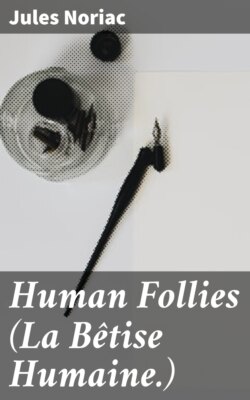Читать книгу Human Follies (La Bêtise Humaine.) - Jules Noriac - Страница 7
На сайте Литреса книга снята с продажи.
CHAPTER V.
ОглавлениеTable of Contents
At the door of the commissary’s office, the clerk politely begged Eusebe to enter first, introducing him into a room divided into two parts by a screen of green lustring. The dilapidated walls were covered with black designs executed by offenders, who had whiled away the tedium of waiting by cultivating the fine arts. The rays of the sun, struggling to enter at a window that looked into the court, shone feebly on an old black desk, upon which a quantity of stamped papers, that seemed to have the jaundice, were lying. Two clerks, whose appearance was in keeping with the place, were scribbling away mechanically. Eusebe, who thought the adjective shabby the proper word with which to qualify the ensemble, said to the clerk,—
“Is this, sir, what is called the formidable appareil of the courts of justice?”
The magistrate’s drudge smiled, and, regarding the young provincialist with a look of benevolence mingled with compassion, replied,—
“No, sir: the courts of justice are held at the Palace: this may be considered as being one of the laboratories that supply them with materials.”
“I don’t understand you,” said the youth.
“No matter,” replied the clerk. “It is to be hoped you will understand better by-and-by. Here comes the commissary. Be seated, and answer the questions he asks you.”
“You told me that your name was Eusebe Martin,” said the commissary.
“Yes, sir.”
“How did you leave your father’s house?”
“By taking the Pénicault coach as far as Vierzon.”
The commissary and his clerk exchanged significant glances. “Write the replies,” said M. Bézieux to the clerk.
“Have you a passport?”
“I don’t know what it is.”
“Write this reply also.”
“What did you say you came to Paris for?”
“I told you I came to Paris to study civilization.”
“To what purpose?”
“Why, to be——civilized.”
“Ah! very well. Have you, besides this thousand francs, the means of existence?”
“By limiting my expenses to ten francs per day, with what I have, I shall be able to live five thousand days,—about fourteen years. Here is my money——”
“Very well. Do you know any one in Paris?”
“Yes, four persons: a coachman who insulted me, a soldier who amused himself at my expense, an old man who abused me, and the shopkeeper whose life I saved.”
“That is sufficient,” said the magistrate. “Your age, the incoherence of your replies, and the large sum of money in your possession make it my duty to detain you until I have more ample information. You need not give yourself any uneasiness, for you will be well treated, and very soon, I trust, you will be set at liberty and restored to your family.”
“I am in no hurry. You can take your own time.”
For the last half-minute the commissary had been making a fruitless search in all his pockets.
“I have lost my handkerchief,” said he to his clerk. “When you go home, call at the house where we have been, and see if it is not there.”
“That will be useless,” said Eusebe: “I saw a child take it out of your pocket and run away.”
“And you did not tell me!” cried M. Bézieux.
“Unless it be an affair of more than ordinary importance, I trouble myself as little as possible about other people’s business. Allow me to offer you another.”
Without waiting for a reply, the young man opened his valise and took out a handkerchief, which he politely handed to the commissary, who refused it.
“Thank you,” said he: “I will send for one. What is this paper that has just fallen out of your valise?”
“My port d’armes.”
“Your license to hunt! You have a license to hunt? Why did you not tell me so before? Let me see it.”
“Because you did not ask me for it.”
M. Bézieux read and reread the paper, and examined the description closely. As Eusebe had two black spots on his left cheek, it was not difficult to discover that the license was his.
“My young friend,” said the magistrate, “a thousand pardons for my questions. It was my duty to do as I have done. You are en règle: I have nothing more to say to you. You are at liberty to go. With your inexperience, you will, sooner or later, certainly be duped. Should you get into trouble, remember that you have in me a friend.”
“Sir,” said Eusebe, “you are very kind, and I am greatly obliged.” He took his valise, and, bowing, retired slowly. On the stairs he stopped an instant, then, in a loud voice, as though some one were listening, he said,—
“This is certainly a very singular—a most incomprehensible—affair! This man, who calls himself a minister of justice, sees me do two good deeds and arrests me, saying that I am either a fool or a madman, and it is only on seeing my license to hunt that he is convinced of his error. Now, the license ought, on the contrary, to have confirmed him in his opinion, and made him believe that I was really insane; for I did a very stupid thing the day I gave the Mayor of Moustier twenty-five francs for the permission to kill birds that were none of his.”
